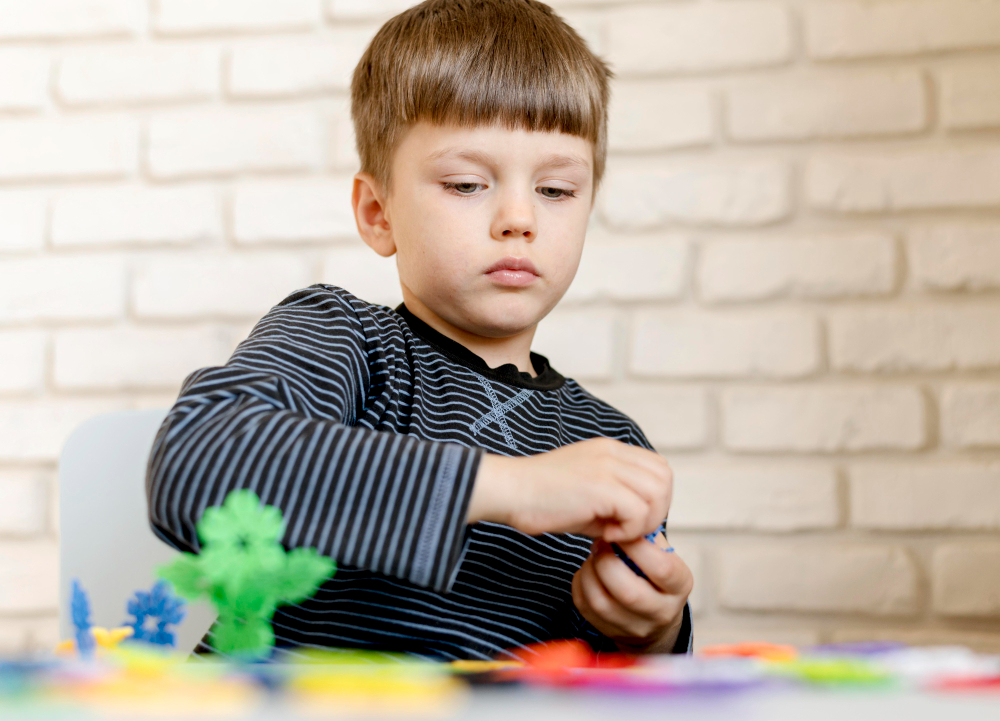
4 Cs of Parenting; Find Out!
Parenting is one of the most rewarding and challenging roles in life. While there’s no one-size-fits-all approach to being a perfect parent, there are certain principles that can guide us in the right direction. These principles can help us provide the best environment for our children to grow, learn, and thrive. In this blog, we’ll explore the 4 Cs of parenting and why they are essential.
Caring
Caring is the cornerstone and one of the 4Cs of good parenting. It involves showing love, affection, and empathy towards your child. It’s more than just providing for their basic needs; it’s about being emotionally present. A caring parent listens to their child, offers comfort, and reassures them during difficult times. This emotional support helps children develop a strong sense of security and self-worth.
Tips for being a caring parent:
- Spend quality time with your child.
- Offer praise and encouragement.
- Be a good listener.
- Show physical affection, like hugs and kisses.
- Create a safe and nurturing environment.
Consistency
Children thrive on routine and predictability. Consistency in parenting helps children understand what to expect and provides a sense of stability. This doesn’t mean you can’t be flexible, but it does mean setting clear expectations and boundaries. When children know the rules and the consequences of their actions, they are better equipped to make good choices.
Tips for being a consistent parent:
- Establish a daily routine.
- Set age-appropriate rules and expectations.
- Follow through with consequences.
- Communicate openly with your child about rules.
Communication
Effective communication is key to understanding your child and helping them express themselves. It’s a two-way street: you need to listen and talk. Encourage your child to share their thoughts, feelings, and concerns. Create an open and non-judgmental space for dialogue. When your child feels heard, they are more likely to come to you with their problems and seek your guidance.
Tips for being a communicative parent:
- Ask open-ended questions to encourage conversation.
- Validate your child’s feelings and opinions.
- Be patient and attentive when they want to talk.
- Use age-appropriate language and explanations.
Control (with Love)
Control in parenting is not about being a strict disciplinarian but about providing structure and guidance. Children need to know the limits and boundaries to feel safe and secure. It’s important to strike a balance between allowing independence and providing guidance. Discipline should always be rooted in love and respect, not punishment.
Tips for being a parent with appropriate control:
- Set clear and reasonable boundaries.
- Use positive discipline techniques, like time-outs or loss of privileges.
- Explain the reasons behind the rules.
- Be a role model for the behavior you expect from your child.
Good parenting is an ongoing journey that involves caring, consistency, communication, and appropriate control. While every family and child is unique, these 4 Cs of good parenting provide a solid foundation for nurturing a healthy parent-child relationship. Remember that no one is a perfect parent, and mistakes happen. What’s crucial is the effort to continuously improve and provide a loving and supportive environment for your child to flourish.

How Much Is Too Much Social Media Use?
In today’s fast-paced digital world, it’s no secret that social media has become an integral part of our lives. Whether it’s scrolling through your Instagram feed, tweeting witty thoughts on Twitter, or catching up with friends on Facebook, it’s hard to imagine a day without a quick peek into the online world. But have you ever stopped to wonder how much is too much when it comes to social media use?
The allure of social media is undeniable. It connects us to friends and family, keeps us informed about current events, and provides endless entertainment. However, it’s essential to strike a balance between digital engagement and the real world. In this blog, we’ll explore the signs of excessive media use and provide some tips on achieving a healthier balance.
Signs of Excessive Social Media Use
You Check Your Phone First Thing in the Morning: If your morning routine includes reaching for your phone to check notifications on various media platforms, it might be a sign of dependency.
Your Screen Time Keeps Increasing: Most smartphones offer screen time monitoring features, which can be a real eye-opener. If your daily average keeps climbing, you might want to reconsider your habits.
It Interferes with Real-Life Relationships: Neglecting in-person interactions in favor of virtual ones is a sign that your social media use might be taking over your life. If your dinner with friends becomes an Instagram photoshoot, it’s time to reassess.
You Feel Anxious or Depressed After Scrolling: Constant exposure to idealized versions of others’ lives can lead to negative self-perception and FOMO (Fear of Missing Out). If scrolling leaves you feeling down, it’s a red flag.
You Can’t Remember the Last Time You Unplugged: If you can’t recall the last time you went an entire day without social media, it might be a good indication that you need to take a step back.
Finding a Healthy Balance:
Set Boundaries: Establish designated “no-phone” times during the day, such as meal times or before bedtime. Stick to them, even if it’s just for an hour.
Limit Notifications: Turn off non-essential notifications to reduce the constant urge to check your phone.
Curate Your Feed: Unfollow or mute accounts that make you feel negative emotions or consume your time needlessly. Your feed should inspire and uplift you.
Engage Actively: Instead of passive scrolling, engage actively with the content. Comment, like, or share posts that truly interest you, and interact with friends.
Use Social Media with Purpose: Define your goals for using social media. Is it to connect with friends, gain knowledge, or showcase your creativity? Knowing your purpose will help you use these platforms more intentionally.
Plan Offline Activities: Make plans for activities that don’t involve screens. Whether it’s hiking, reading a book, or simply spending quality time with loved ones, investing in offline experiences can be incredibly rewarding.
Practice Mindfulness: Be aware of how you feel when using social media. If you notice negative emotions, take a break, and reflect on what’s causing them.
Remember, social media is a tool that can be harnessed for good, but it can also become a source of stress and distraction. It’s up to you to strike a balance that allows you to enjoy the benefits without being consumed by its drawbacks.
In conclusion, the question of how much is too much social media use is a personal one. It varies for each individual. Pay attention to the signs that indicate excessive use and be proactive in finding that sweet spot where social media enhances your life rather than dominating it. Ultimately, your well-being and the quality of your real-life relationships should be the guiding factors in determining the right amount of social media for you.

The Nature vs Nurture Child Development
Child development is a fascinating journey that begins the moment a child is born and continues throughout their life. As parents, educators, and caregivers, we often wonder what factors influence a child’s growth and development. The age-old debate of nature vs nurture remains at the forefront of discussions surrounding child development. In this blog, we’ll delve into the key concepts and differences between these two factors and how they shape a child’s growth.
What is Nature?
When we talk about nature in the context of child development, we are referring to the biological and genetic factors that influence a child’s development. These factors are present from the moment a child is conceived and include elements like genes, inherited traits, and temperament.
Genes play a pivotal role in determining a child’s physical and psychological characteristics. They control everything from a child’s hair and eye color to their predisposition to certain health conditions. Some children may be naturally gifted in areas like music, sports, or mathematics due to genetic predispositions.
Temperament is another significant aspect of a child’s nature. It refers to a child’s inherent characteristics such as being introverted or extroverted, resilient, or sensitive. A child’s temperament can affect how they interact with their environment and the people around them.
What is Nurture?
Nurture, on the other hand, encompasses all the environmental influences a child experiences throughout their life. These influences include their family, upbringing, social surroundings, and educational experiences. Nurture plays a vital role in shaping a child’s personality, behavior, and overall development.
Family and caregivers have a profound impact on a child’s upbringing. The way they are raised, the values instilled, and the love and care provided all contribute to a child’s emotional and psychological development.
Social interactions and peer relationships also play a role in nurture. A child’s experiences with friends, teachers, and mentors can shape their social skills, communication abilities, and overall personality.
Education and the learning environment are critical components of nurture. The quality of education a child receives, the opportunities they are exposed to, and the encouragement they receive all influence their cognitive and intellectual development.
The Interaction between Nature Vs Nurture
It’s essential to understand that nature and nurture do not exist in isolation. Instead, they interact and influence each other throughout a child’s development. Genes may predispose a child to certain traits, but it’s the nurturing environment that can either amplify or mitigate these predispositions.
For example, a child may have a genetic inclination towards music, but without exposure to musical instruments and a nurturing environment, that potential may remain untapped. Similarly, a child with a genetic predisposition to a specific health condition may benefit from early interventions and healthcare in a nurturing environment.
The nature vs nurture child development highlights the complex interplay between inherent genetic factors and the environmental influences that shape a child’s growth. In comparison, nature provides the foundation, nurture molds and sculpts a child’s personality, skills, and overall development.
As parents and caregivers, it’s crucial to recognize the significance of both factors and provide a supportive, nurturing environment that fosters a child’s unique potential. By understanding this delicate balance, we can better guide children on their journey of growth and self-discovery, ensuring they reach their full potential. Remember, it’s not a matter of nature vs nurture, but rather how they work together to create the amazing individuals children become.

How Parents Can Unintentionally Harm Their Children
Parenthood is undoubtedly one of life’s most challenging and rewarding journeys. As parents, we all want what’s best for our children, but sometimes, despite our best intentions, we can inadvertently harm them. It’s essential to recognize that this harm often stems from love, misunderstanding, or a lack of awareness. In this blog, we’ll explore some common ways parents can unintentionally harm their children and offer suggestions for healthier alternatives.
Overprotection
One of the most well-intentioned but potentially harmful behaviors parents engage in is overprotectiveness. While it’s natural to want to shield your child from harm, being overly protective can stunt their growth and hinder their ability to develop resilience and problem-solving skills. Instead, try to strike a balance between safety and allowing your child to explore and learn from their experiences. Encourage them to take calculated risks and learn from their mistakes.
Unrealistic Expectations
Setting overly high or unrealistic expectations for your child can lead to feelings of inadequacy and low self-esteem. It’s crucial to understand that every child is unique and has their own strengths and weaknesses. Rather than pushing your child to meet your expectations, focus on encouraging their interests and passions and supporting them in their own journey of self-discovery.
Lack of Communication
Communication is the cornerstone of any healthy parent-child relationship. Failing to listen to your child’s thoughts and feelings can make them feel unheard and unvalued. Take the time to engage in open and honest conversations with your child, and show empathy and understanding. This will help them develop trust and emotional intelligence.
Comparisons
Comparing your child to their siblings or peers can be detrimental to their self-esteem and overall well-being. Each child is unique, and comparisons can lead to jealousy, resentment, and a sense of inadequacy. Instead of comparing, celebrate your child’s individual achievements and encourage them to pursue their interests and passions.
Neglecting Self-Care
Parents often prioritize their children’s needs above their own, which is admirable but can lead to burnout and stress. Neglecting self-care can harm your child indirectly as they may feel responsible for your unhappiness. Remember that taking care of your own physical and mental well-being sets a positive example for your child and allows you to be a more present and supportive parent.
Harsh Discipline
Using overly harsh or punitive discipline methods can have long-lasting negative effects on your child’s emotional and psychological well-being. Instead of resorting to punishment, focus on teaching your child about consequences, setting clear boundaries, and using positive reinforcement when they behave well. Encourage them to understand the reasons behind rules rather than just enforcing them blindly.
Ignoring Mental Health
Mental health is just as important as physical health, and ignoring signs of distress in your child can be harmful. Be attentive to changes in behavior, mood, or social interactions that might indicate your child is struggling. Seek professional help if needed and provide a supportive and understanding environment for them to talk about their feelings.
Parenting is a complex and sometimes challenging journey, and no one gets it perfect all the time. However, by being aware of these potential pitfalls and making a conscious effort to avoid them, you can create a more nurturing and supportive environment for your child to thrive. Remember that parenting is a learning experience for both you and your child, and your love and commitment are the most valuable tools you have to help them grow into happy and healthy adults.

How to Deal with a Child Who Hates School
It’s a common scenario for many parents: your child hates going to school. They may complain about it, throw tantrums, or even fake illnesses to avoid going. As a parent, it can be incredibly frustrating and concerning. However, it’s essential to approach this situation with empathy, patience, and a problem-solving mindset. In this blog, we’ll explore some practical tips on how to deal with a child who hates school and help them find joy and motivation in their education.
Understand the Root Cause
The first step in addressing your child’s hesitation toward school is to try to understand the underlying reasons. Sometimes, it’s a specific issue like bullying, difficulty with a particular subject, or a negative experience with a teacher. Start an open and non-judgmental conversation with your child to get to the bottom of their feelings. Listen carefully to their concerns and fears.
Communicate and Offer Support
Once you have a better understanding of why your child dislikes school, let them know that you’re there to support them. Assure them that you value their feelings and want to help. Sometimes, just knowing that they can talk to you about their worries can make a significant difference in how they feel.
Work with Teachers and School Staff
Don’t hesitate to reach out to your child’s teacher or school counselor. They can provide valuable insights into your child’s behavior and academic performance. Together, you can come up with strategies to address specific issues and make school a more positive experience for your child.
Create a Positive Morning Routine
Mornings can be hectic, and a rushed start to the day can set a negative tone. Establish a calm and organized morning routine to make the school day more pleasant. Prepare school bags and lunches the night before, wake up a bit earlier, and ensure your child has enough time for a balanced breakfast.
Explore Different Learning Styles
Sometimes, a child’s dislike for school is related to the way they are taught. Investigate different learning styles and methods that might better suit your child’s needs. Experiment with visual aids, hands-on activities, or alternative resources to make learning more engaging.
Encourage Extracurricular Activities
Participating in extracurricular activities can help your child develop interests outside the classroom, which can make school more appealing. Let them explore different hobbies and activities, such as sports, arts, or clubs, that align with their passions.
Celebrate Small Achievements
Acknowledge and celebrate your child’s successes, no matter how small they may seem. Praise their efforts and achievements to boost their self-esteem and motivation. Positive reinforcement can go a long way in changing their attitude toward school.
Seek Professional Help if Needed
If your child’s hatred for school persists and significantly impacts their well-being, it might be time to seek professional help. A child psychologist or counselor can work with your child to address deeper emotional or psychological issues that may be contributing to their school-related struggles.
How to deal with a child who hates school can be challenging, but with patience, understanding, and proactive steps, you can help your child navigate their academic journey more positively. Remember that every child is unique, and what works for one may not work for another. Be flexible in your approach and always keep the lines of communication open. Ultimately, your unwavering support and dedication will play a crucial role in helping your child develop a more positive attitude toward school.

What Are The Golden Rules Of Parenting?
Parenting is an incredible journey filled with love, joy, and sometimes, a fair share of challenges. There’s no one-size-fits-all manual for raising children, but there are some universal principles, often referred to as the “Golden Rules of Parenting,” that can guide you on this amazing adventure. These rules are not set in stone, but they offer valuable insights and strategies to help you nurture your child’s growth and development while maintaining a strong and loving bond.
Love Unconditionally
The foundation of parenting begins with love. Unconditional love is the key to building a secure and confident child and one of the best golden rules of parenting. Show your love through hugs, kisses, words of affirmation, and quality time spent together. Let your children know that your love for them is unwavering, regardless of their behavior or mistakes.
Set Boundaries and Consistency
Children thrive in an environment with clear boundaries and consistent rules. Establish age-appropriate rules and consequences, and enforce them fairly. Consistency helps children understand what is expected of them and provides a sense of security.
Communicate Openly
Effective communication is essential in any relationship, including the parent-child dynamic. Encourage your children to express their thoughts and feelings without fear of judgment. Listen actively, ask open-ended questions, and provide guidance when needed. Be a role model for healthy communication by resolving conflicts peacefully.
Be Patient
Parenting is a long journey filled with ups and downs. Patience is your greatest ally and is one of the best golden rules of parenting. Understand that children make mistakes, learn at their own pace, and may need repeated guidance. Stay calm, take deep breaths, and practice empathy during challenging moments.
Lead by Example
Children often mirror their parents’ behavior. Model the values and behaviors you want your children to adopt. Show them kindness, respect, responsibility, and empathy. Your actions speak louder than words.
Encourage Independence
Foster your child’s independence by allowing them to make age-appropriate choices and decisions. Encouraging independence helps them develop problem-solving skills and a sense of autonomy. Be there to support and guide them as they explore the world.
Prioritize Quality Time
In today’s fast-paced world, spending quality time with your children is more important than ever and is one of the best golden rules of parenting. Create special moments together, such as family dinners, game nights, and outings. These shared experiences strengthen your bond and create lasting memories.
Celebrate Achievements, Big and Small
Celebrate your child’s achievements, whether it’s a small milestone or a significant accomplishment. Acknowledge their efforts and let them know you are proud of them. Positive reinforcement boosts their self-esteem and motivation.
Be Flexible
While consistency is important, it’s also essential to be flexible and adaptable. As your child grows and changes, their needs and challenges will evolve. Be open to adjusting your parenting approach as necessary.
Practice Self-Care
Remember, you can’t pour from an empty cup. Taking care of yourself is not selfish but necessary for effective parenting. Prioritize self-care to maintain your physical and emotional well-being, so you can be the best parent you can be.
Parenting is a lifelong journey filled with learning experiences and unforgettable moments. The Golden Rules of Parenting provide a roadmap to navigate this incredible adventure with love, patience, and wisdom. Keep in mind that there is no one “right” way to parent, and it’s okay to seek support and guidance when needed. Embrace these golden rules as a foundation, and tailor them to your unique family dynamic, ensuring a nurturing and loving environment for your children to flourish.

What To Do When You Have An Autistic Child
Bringing up a child is an incredible journey filled with joy, challenges, and countless learning opportunities. When you have a child with autism, that journey becomes uniquely beautiful. Autism, a complex neurological condition, brings its own set of joys and challenges. As a parent, you play a crucial role in helping your child thrive. In this blog, we’ll explore some practical tips and insights on how to bring up an autistic child.
Educate Yourself
Understanding autism is the first step to providing the best support for your child. Take the time to educate yourself about autism spectrum disorder (ASD). Read books, attend workshops, and seek out reputable online resources. Knowledge empowers you to make informed decisions and helps you appreciate your child’s unique perspective.
Embrace Individuality
Every child with autism is unique. Autism is a spectrum, which means it manifests differently in each individual. Instead of trying to fit your child into a mold, celebrate their individuality. Recognize their strengths, interests, and challenges. Embrace the fact that your child is one-of-a-kind.
Build a Support Network
Raising a child with autism can be emotionally and physically demanding. Don’t be afraid to ask for help. Build a strong support network that includes family, friends, teachers, therapists, and support groups. Connecting with others who understand your journey can provide invaluable guidance and emotional support.
Early Intervention is Key
Early intervention services can make a significant difference in your child’s development. If you suspect your child may have autism, seek an evaluation as early as possible. Early intervention programs can help address developmental delays, speech and communication difficulties, and social challenges.
Create a Structured Environment
An autistic child thrives in structured environments. Establish routines and schedules to provide predictability and stability in your child’s life. Visual schedules and timers can be helpful tools to make transitions smoother.
Effective Communication
Communication is a vital skill for both you and your child. Use clear, concise language, and be patient when waiting for a response. An autistic child may use alternative communication methods, such as sign language or augmentative and alternative communication (AAC) devices. Explore what works best for your child and encourage their communication efforts.
Sensory Sensitivities
Many autistic individuals have heightened sensory sensitivities. Pay attention to your child’s sensory preferences and sensitivities. Provide sensory-friendly environments and tools like noise-canceling headphones, weighted blankets, or fidget toys to help them regulate their sensory experiences.
Encourage Social Interaction
Social skills can be challenging for an autistic child, but they can be learned and improved with practice. Encourage social interaction by setting up playdates, joining social groups, or enrolling in social skills training programs. Be patient and understanding as your child navigates social situations.
Celebrate Achievements
Celebrate even the smallest achievements and milestones. Positive reinforcement can boost your child’s confidence and motivation. Praise their efforts, and be their biggest cheerleader.
Self-Care for Parents
Taking care of your child is essential, but don’t forget to take care of yourself too. Parenting can be overwhelming, and it’s okay to seek respite when needed. Prioritize self-care activities that help you recharge and stay mentally and physically healthy.
Bringing up an autistic child is a journey filled with unique challenges and rewards. Remember that autism is just one aspect of your child’s identity, and they have a world of potential waiting to be discovered. By educating yourself, embracing individuality, seeking support, and providing a loving and understanding environment, you can help your child thrive and reach their full potential. Every step you take in this journey is an opportunity for growth and connection with your amazing child.

The Importance of Parenting Styles When Raising Children
Parenting is a journey filled with love, joy, and sometimes, a few challenges along the way. As parents, we all want the best for our children, and one key factor that significantly influences their development is our parenting style. In this blog, we’ll delve into the importance of parenting styles when raising children and how they can shape their future.
Understanding Parenting Styles:
Parenting styles refer to the patterns of behavior, strategies, and attitudes that parents employ while raising their children. These styles are often influenced by our own upbringing, personal beliefs, and cultural backgrounds.
Authoritative Parenting:
Authoritative parents are known for being nurturing and responsive to their children’s needs while also setting clear boundaries and expectations. They provide love and support while encouraging independence. This parenting style is often associated with positive child outcomes, such as high self-esteem, better social skills, and academic success.
Authoritarian Parenting:
Authoritarian parents, on the other hand, tend to be strict and demanding. They have high expectations and rules that children must follow without question. While discipline is important, an excessively authoritarian approach can lead to negative consequences, such as rebellion or low self-esteem.
Permissive Parenting:
Permissive parents are characterized by their leniency and a lack of strict rules. They are often warm and indulgent, allowing their children to make their own choices without many consequences. While this approach can foster independence, it can also lead to behavioral problems and a lack of respect for authority.
Neglectful Parenting:
Neglectful parents are emotionally distant and uninvolved in their children’s lives. They may be neglectful due to their own personal issues or a lack of awareness of their child’s needs. This style can have severe consequences for a child’s emotional and psychological development.
The Impact on Children:
Now that we’ve discussed the four primary parenting styles let’s dive into their impact on children’s development:
- Emotional Well-being: Children raised by authoritative parents tend to have higher self-esteem and better emotional regulation. They feel secure in their parent’s love and guidance.
- Academic Success: Authoritative parenting often leads to children who are motivated and excel academically. They understand the importance of discipline and hard work.
- Social Skills: Children of authoritative parents tend to have better social skills, as they have experienced positive communication and collaboration with their parents.
- Behavioral Problems: Permissive parenting can sometimes lead to behavioral problems in children, as they may lack the structure and boundaries needed to learn self-control.
- Rebellion: Authoritarian parenting can sometimes backfire, leading to rebellion and a strained parent-child relationship.
- Low Self-esteem: Neglectful parenting can result in low self-esteem and feelings of abandonment in children.
In conclusion, parenting styles play a crucial role in shaping our children’s lives. Finding the right balance between love and discipline, setting clear expectations, and being emotionally supportive is essential. Remember that there’s no one-size-fits-all approach to parenting, and it’s okay to adapt your style as your child grows and their needs change. Ultimately, the goal is to raise confident, well-adjusted individuals who can thrive in the world. So, take the time to reflect on your parenting style and its impact on your child’s development, and don’t hesitate to seek support and guidance when needed.

How Kids Can Be Affected By Media Use
In today’s digital age, media surrounds us. From smartphones and tablets to TV screens and video games, it’s hard to escape the constant influx of information and entertainment. While media can be a valuable source of education and entertainment, excessive or inappropriate use can have a significant impact on children’s development. In this blog, we’ll explore how kids can be affected by media use and offer some tips for parents and caregivers to ensure a healthy balance.
Physical Health
Excessive media use can lead to sedentary behavior, which can contribute to health problems like obesity and sleep disturbances. When kids spend too much time in front of screens, they’re less likely to engage in physical activities that are crucial for their growth and well-being. Encouraging outdoor play and setting limits on screen time can help mitigate these effects.
How Kids Can Be Affected By Media Use – Mentally
Media exposure, especially to violent or disturbing content, can impact a child’s mental health. Constant exposure to violence or frightening images can lead to increased anxiety, nightmares, and desensitization to real-world violence. It’s essential to monitor the content your child consumes and have open conversations about what they see online or on TV.
Social Development
Excessive screen time can hinder a child’s social development. When kids spend too much time in front of screens, they have fewer opportunities to interact with peers, develop social skills, and build meaningful relationships. Encourage face-to-face interactions, playdates, and group activities to foster healthy social development.
How Kids Can Be Affected By Media Use – Cognitively
While some educational content can be beneficial, excessive media use can impede cognitive development. It can lead to shorter attention spans, decreased problem-solving skills, and difficulties with critical thinking. Encourage a balance of educational and recreational screen time and engage in activities that promote critical thinking and creativity.
Sleep Disruptions
The use of screens before bedtime can disrupt sleep patterns. The blue light emitted by screens can interfere with the production of melatonin, a hormone that regulates sleep. Establish a bedtime routine that includes turning off screens at least an hour before sleep to ensure your child gets a good night’s rest.
Influence on Behavior and Values
Media has a significant influence on a child’s behavior and values. Kids often imitate what they see on screens, which can include aggressive or inappropriate behavior. Be mindful of the content your child is exposed to and use it as an opportunity to discuss values and behavior expectations.
How Kids Can Be Affected By Media Use – Academic Performance
Excessive media use can lead to poor academic performance. When kids spend too much time on screens, they may neglect their homework, reading, and other educational activities. Create a conducive study environment and set limits on screen time during homework and study hours.
Tips for Parents and Caregivers:
Set Screen Time Limits: Establish clear guidelines for screen time and stick to them. Encourage a healthy balance between screen-based activities and other forms of play and learning.
Monitor Content: Be aware of the content your child is consuming. Use parental controls and content filters to ensure age-appropriate material.
Engage and Communicate: Watch and play with your child. Engage in discussions about the media they consume, helping them process and understand what they see.
Encourage Outdoor Activities: Promote physical activity and outdoor play to counteract the sedentary nature of media use.
Create Tech-Free Zones: Designate areas in your home, such as the dining room or bedrooms, as tech-free zones to encourage family interaction and quality time.
In conclusion, media can be a double-edged sword for kids. While it offers educational and entertainment opportunities, excessive or inappropriate use can have detrimental effects on their physical, mental, and social development. As parents and caregivers, it’s essential to be proactive in guiding your child’s media consumption and fostering a balanced and healthy relationship with technology.

The 10 Timeless Principles of Good Parenting
Parenting can be both a rewarding and challenging journey. While there’s no one-size-fits-all approach to raising children, certain timeless principles of good parenting can serve as a reliable compass to navigate this incredible adventure. Whether you’re a new parent or have years of experience, these timeless principles of good parenting can help you build strong, loving relationships with your children and raise them to become happy, responsible, and well-adjusted adults.
Unconditional Love
At the heart of good parenting lies unconditional love. Your children should always feel loved and accepted, regardless of their actions, achievements, or mistakes. Love provides them with a secure foundation upon which they can build their self-esteem and confidence.
Effective Communication
Effective communication is key to understanding your child’s thoughts, feelings, and needs and is one of the foremost principles of good parenting. Listen actively, ask open-ended questions, and show empathy. Encourage your child to express themselves, and be attentive to their non-verbal cues. Good communication fosters trust and helps resolve conflicts.
Consistency and Boundaries
Children thrive in a structured environment with clear rules and boundaries. Be consistent in your discipline and expectations, and explain the reasons behind your rules. Consistency helps children feel secure and understand the consequences of their actions.
Positive Reinforcement
Praise and positive reinforcement go a long way in motivating children to make good choices and are one of the foremost principles of good parenting. Acknowledge their efforts and achievements, no matter how small. This encourages them to develop a positive self-image and reinforces desired behaviors.
Lead by Example
Children often model their behavior after their parents. Be a role model by demonstrating the values and behaviors you want to instill in your child. Show respect, kindness, and responsibility in your actions, and your child is likely to follow suit.
Patience
Parenting can test your patience, but it’s essential to remain calm and composed when it comes to principles of good parenting. Understand that children will make mistakes and have their own pace of development. Patience allows you to guide them gently through challenges and setbacks.
Quality Time
In today’s busy world, spending quality time with your children is crucial. Set aside dedicated moments for bonding, whether it’s reading a bedtime story, playing games, or having family meals together. These moments create lasting memories and strengthen your connection.
Encourage Independence
As your child grows, encourage their independence and decision-making skills, this is one of the foremost principles of good parenting. Allow them to take on age-appropriate responsibilities and learn from their experiences. Empowering them fosters self-confidence and resilience.
Flexibility
While consistency is important, it’s also vital to adapt to your child’s changing needs and stages of development. Flexibility allows you to adjust your parenting approach to meet their evolving requirements.
Be Present
In the age of smartphones and constant distractions, being present with your child is more important than ever. Put away screens and focus on the here and now when you’re with your child. Show them that they have your full attention and support.
Good parenting is a lifelong journey filled with love, challenges, and growth. By following these timeless principles of good parenting, you can build strong, loving relationships with your children. Remember that no one is a perfect parent, but your dedication to these principles will guide you on the path to raising happy, responsible, and well-adjusted adults.
